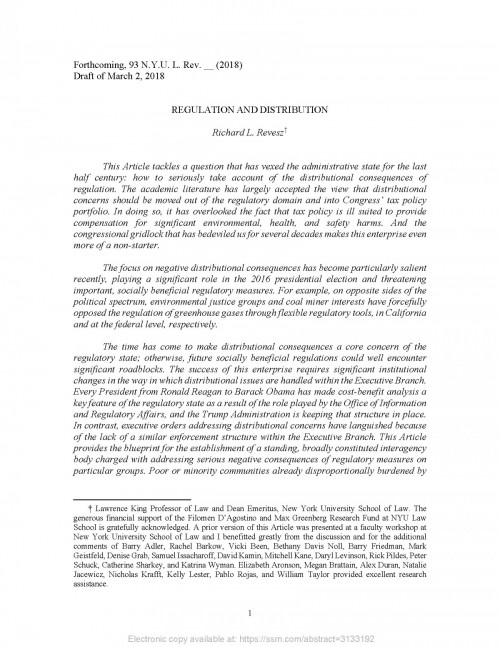-

Regulation and Distribution
Most regulations seek to improve social welfare, but maximizing overall welfare may not help or protect all groups evenly. Many economists suggest handling unequal regulatory effects through the tax system. But some harms—like the disproportionately high environmental pollution felt by poor and minority communities and loss of the employment base in rural communities due to shifts in the economy—cannot be addressed by monetary compensation alone. A new article by Richard Revesz, published in the NYU Law Review, offers a blueprint for establishing a standing, broadly constituted interagency body charged with addressing serious negative consequences of regulatory measures on particular groups.
-
Comments to Interior on Offshore Drilling Safety Requirements
The Bureau of Safety and Environmental Enforcement (BSEE) within the Department of the Interior is tasked with setting safety and environmental standards for offshore oil and gas production and exploration in federal waters. While BSEE updated its safety requirements in 2016, it now proposes to weaken and repeal some of these safety requirements in order to encourage more oil and gas production. In our comments on the proposed rule, we argue that the agency has failed to provide a reasoned explanation for repealing these requirements, which were part of a comprehensive update to safety regulations that had not been revised since 1988.
-
Comments to the Department of Labor on the Rescission of Tip Regulations
The Department of Labor recently proposed rescission of tip regulations under the Fair Labor Standards Act. We submitted comments explaining the Department’s failures, including to quantify important effects of the proposed rescission, to consider a range of realistic assumptions, or even to explain why the rescission’s purported benefits justify the total possible costs.
-
Policy Integrity Brief Cited in Housing Rule Decision
In a decision ordering the Department of Housing and Urban Development (HUD) to implement a fair housing rule that the Trump administration sought to delay, Chief Judge Beryl A. Howell of the U.S. District Court for the District of Columbia cited Policy Integrity’s amicus brief in the case. The Small Area Fair Market Rent rule, finalized under President Obama, seeks to give low-income families greater access to housing in higher-rent neighborhoods and break up areas of concentrated poverty. Our brief argued that, in suspending the rule’s implementation for two years, HUD violated principles of administrative law by disregarding economic impacts and failing to seek public comment. Judge Howell found that HUD’s decision to delay the rule exceeded the agency’s legal authority and that the reasons it gave for doing so were arbitrary and capricious. She ordered HUD to implement the rule by January 1, 2018.
-
Briefs and Comments on Department of Education’s Borrower Defense Rule
Under Secretary Betsy DeVos, the Department of Education has twice delayed implementation of the Borrower Defense Rule, a 2016 regulation designed to help students who have been defrauded by for-profit educational institutions discharge their federal student loans. In our amicus brief supporting borrower and state challenges to the delay, we argue that the Department violated the Administrative Procedure Act by arbitrarily disregarding the harms that the delays impose on student borrowers. We also submitted a comment letter to the agency regarding the second delay.
-
ACUS Adopts Recommendations on Marketable Permits
The Administrative Conference of the United States (ACUS), an independent federal agency that recommends improvements to government processes and procedures, recently approved a set of recommendations from Policy Integrity’s Jason Schwartz concerning marketable permits. Marketable permits, in the appropriate context, are a powerful tool for achieving policy objectives more efficiently, by letting market participants buy and sell compliance obligations. But like all markets, permit markets require proper oversight to prevent market manipulation. The new recommendations adopted by ACUS provide agencies with best practices on structuring and overseeing marketable permit programs.
-
Comments on Religious Exemption Rule and Contraception
Under the Affordable Care Act, federal guidance requires most health insurance plans to cover contraceptive services. Previously only houses of worship and their “integrated auxiliaries” were exempt from this requirement, but a group of agencies recently issued a joint rule expanding this exemption to nonprofits, higher education institutions, closely held for-profit corporations, and publicly traded for-profit corporations with religious objections to providing contraceptive coverage. Our comments argue that the agencies’ cost-benefit analysis for expanding the exemption is unreasonable.
-
Brief on HUD’s Suspension of Housing Voucher Reform
The Department of Housing and Urban Development (HUD) recently suspended a rule to increase the availability of affordable housing in higher-rent neighborhoods. Our amicus brief in a suit against HUD argues that the suspension violates administrative law by disregarding economic impacts and failing to first seek public feedback.
-
Brief on EPA Chemical Disaster Rule Delay
EPA recently delayed the effective date of a rule that would have decreased the severity and number of chemical accidents at manufacturing facilities and refineries. State and NGO plaintiffs sued EPA over the delay, arguing that EPA did not have statutory authority to issue it, and that the delay was arbitrary and capricious. We filed a brief in support of petitioners arguing that EPA did not offer an adequate explanation for choosing to forgo the benefits of the chemical disaster rule.
-
Comments on Reconsideration of NHTSA Rule to Update Civil Penalties
In December 2016, the National Highway Traffic Safety Administration (NHTSA) finalized a rule that updates civil penalties for car manufacturers that violate fuel economy standards. NHTSA is now reconsidering the rule, claiming it would have a significant negative economic impact. The agency provides no evidence that economic circumstances have changed since the rule’s finalization to make the rule more costly. Our comments argue that the agency should not proceed with the proposed reconsideration, because it inadequately explained why it changed positions. If the agency does continue with the reconsideration, both the Inflation Adjustment Act and economic cost-benefit analysis would justify an update to the penalties rates rather than maintaining the original penalty rate from 1975.
Viewing recent projects in Consumer and Healthcare Protection


